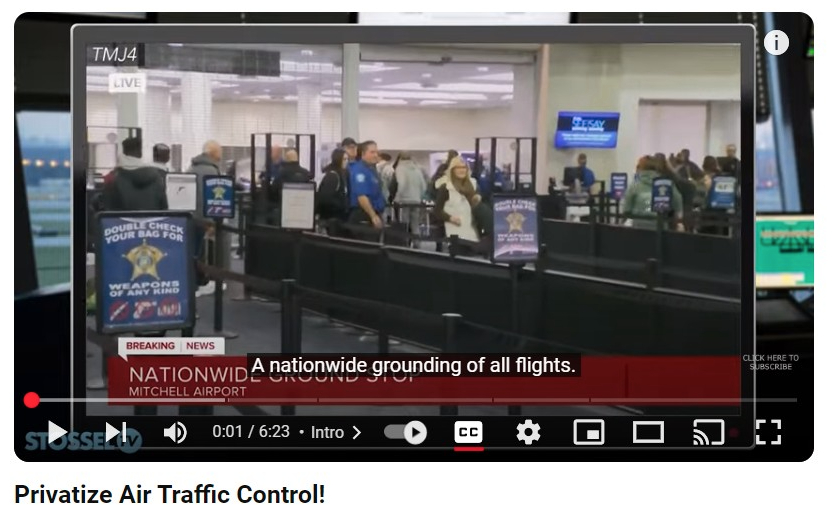Should The U.S. Privatize Air Traffic Control (ATC)?
I don't really have much of an idea how the control system works, but off the top of my head I would say No, it should not be privatized. It is simply too large and too complex to think that a group of independent companies would work together to make it all happen.
Are there any countries with anything like our size and number of flights that have made it work? I don't think so.
As much as I dislike government ownership, this is one that belongs with government, not independent companies.I like the concept. The 'paper slip' vs the computer 'slip' is a stark example of the contrast between privatization vs. government operation.
Relative to scale (ie. US stats), I don't think it would be a problem. A couple of the video's examples (particularly the 'remote' control tower setup) indicated land distance wasn't an obstacle and optimism in the capabilities of the computer-based systems says the U.S. congestion densities are manageable.
It's working for a lot of other nations. Your concern that the job was too big for independent companies prompted a thought about NASA vs. SpaceX. I don't think the government would do it cheaper or better.
GAI don't think the comparison of NASA and SpaceX has any relevance. The two are not cooperative in any major sense, although they do share some equipment and tasks.
Air traffic, on the other hand, must cooperate every second of the day as planes are guided and handed off between areas. Let Las Vegas set a plane at 30,000 feet going to Detroit and Kansas City set one at the same height going to LA and there is trouble. It's that kind of thing that would give me the wobbles trying to figure out how to force independent companies to cooperate.At the risk of being dense, I'm not sure I understand your "cooperative" point. My reference was to the performance of similar efforts; the government's NASA vs, the private market's SpaceX.
Relative to your example, a modernized system using satellites (the FAA's proposed NextGen program) will handle 'hand-offs' (planes leaving and entering an airspace) in milliseconds. As a centralized data port, the system would easily handle those Detroit and LA flights.
The "independent companies" point isn't as easily digested. First, as currently in place in other countries, and as proposed for the U.S.'s NextGen plan, it's 'company', as in a monopolistic position. That one is going to take some thought.
GA
I agree completely with you, wilderness. Privatizing air control will bring more disaster than the imaginary profit. Frankly, it should be left to the Federal government.
This is the one time I completely agree with you I don't trust the private sector in an area such as this. I see this as a Governmental function, outsourcing has consistently failed where ever it was tried. There was a reason that the Government took over the airport passenger screening function from the private sector.
The generally accepted reason for creating the TSA was security protocol standardization (an immediately post-9/11 decision), not inefficiency or private company shenanigans.
The three big names in privatization are Germany (30 years), the UK (20 years), and Sweden (10 years). All have maintained or improved their pre-privatization safety records. That's decades of proof the concept can be safe.
There is a lot of information available to argue against your reasoning. Safety isn't a negative. And greed for 'profit' isn't 'really' a worry because the systems use government/private partnerships and non-profit structures.
Those are just opinions. I think they are well-supported but they aren't irrefutable 'facts.'
GAYou're welcomed. But I think politics is like a religious issue between.
I know nothing about air traffic control nor how it is ran, but I've spent years following hobbyists who like following/monitoring the public radars and radio waves. It seems to me like these hobbyists are mostly knowledgeable veterans from the aviation sector.
If good ole boy can sit in his undies and track the movements of every celebrity/military flight and radio communication from the comfort of his crumb-covered armchair at home, then I'd imagine privatizing it all would provide for a much cheaper and efficient system. I've seen hobbyists perform and conclude investigations faster than and just as accurate as any public agency when it comes to aviation incidents.
My only worry with privatizing everything is that the private sector tends to always find a way to optimize the soul out of everything. Not sure how it'd play into ATC, but I bet they'll find a way to make it more soul sucking.I wouldn't take your bet, but . . . the 'privatized' ATCs that I looked at were all structured as non-profits. The UK's non-profit is a private /public partnership.
I think the non-profit part is a safeguard against cutting corners.
With the current rate of AI development, I can see a semi-autonomous AI controller doing a better job than a human could.
GATaking the time to think about it, I'm not even sure I truly understand the difference between privatizing an industry and having it be public.
Any chance you can summarize it for me within the context of ATC?
As I understand it now, ATC is mainly controlled by a conglomerate of corpos that work hand in hand with the government to fill roles. My further understanding is that the government regulates that conglomerate in the form of the FAA. The only thing privatizing aviation would do, by my understanding, is remove the ownership of the airports from the government and hand it over to these conglomerates, essentially put them up for sale on the open market.
I also understand that the scope of my knowledge on this is elementary at best. Help me. I'd like to be able to discuss this hot topic from a more well-read perspective, but I don't even know where to begin.My understanding is as elementary as yours. It does seem to boil down to a 'new owner' taking over. The difference I see is in motivation. The government has no motivation to do better—beyond pacifying squeals of discontent, but private entities have market motivation—succeed or fail.
There are certainly other factors and complexities, but I think that is the bottom line.
GAAh, that hadn't even dawned upon me as a possibility until you said it. I was thinking within the small box of ownership of operations.
Privatization= Innovation
I'll keep playing with the idea, but as of now I support the privatization of ATC. Like you said, AI-assisted ATC would probably be a very productive venture for everyone, and I'd rather the expenses of that fall on corporations than taxpayers funding it through government development contracts.
Related Discussions
- 25
Why are we privatizing air traffic control?
by ptosis 8 years ago
Remember Reagan firing all those ATC's when they were on strike? Please discuss if this is a good thing or a bad thing.Should air traffic controllers be privatized? - Canada, France, Germany, and the United Kingdom have private ATC. Delta Air Lines, says separating air traffic control...
- 14
Do you think it is time to privatize essential services, such as air traffic con
by Chuck Nugent 12 years ago
Do you think it is time to privatize essential services, such as air traffic control?President Obama and the FAA has begun eliminating air traffic controllers at small airports and reducing them at large and busy airports and blaming these actions on the sequester. In order to prevent...
- 14
The Democrats Show Why They Lost
by Readmikenow 7 months ago
I was conflicted about sharing this article. I truly don't want the democrats to change. I would support them running Kamala Harris again for president in 2028 and once again forgoing a primary. Just give her a billion dollars to spend and let her start campaigning. Don't...
- 20
SCOTUS Religious public schools
by IslandBites 8 months ago
Supreme Court to decide whether states can allow religious public schoolsThe Supreme Court agreed Friday to decide whether the state of Oklahoma may fund a proposed Catholic charter school, a blockbuster case that could redraw the line between church and state by allowing government to establish...
- 174
Privatization is the answer to everything
by kerryg 14 years ago
A diplomatic cable released by Wikileaks reveals that DynCorp, a private security contractor tasked with training the Afghan police, may have used US taxpayer dollars to throw a "bachi bazi" party for Afghan police recruits."Bachi bazi" parties are a pre-Islamic tradition...
- 7
Privatization of the Military and its effects on mass shootings.
by Mike Russo 12 years ago
When I was in the Air Force (1956 to 1960}, there was very little privatization in the military. I was in Japan on a remote radar site and we did have Japanese house boys. But that was about the extent of it. We had military police, cooks, quarter masters, engineers and facilities. Today we...











